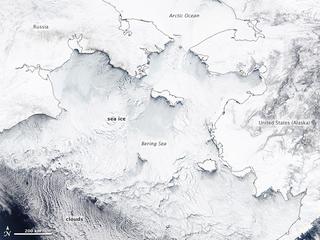Bering Sea Ice Extent Breaks Records

Tuesday, April 10 2012
The Arctic has crossed the threshold from winter into spring. Scientists at the National Snow and Ice Data Center announced last week that Arctic sea ice reached its maximum extent on March 18 and is slowly beginning its summer retreat.
Despite a chilly winter in some part of the Arctic, the overall ice cover was the ninth lowest since the satellite record began in 1979. That’s still a sizeable quantity of ice – 5.9 million square miles, or roughly the size of the United States and Canada combined – but about 200,000 square miles less than the 30-year average.
Most of the missing ice was in the Barents and Kara Seas, above western Russia, where higher-than-average temperatures kept sea ice from forming.
Meanwhile, closer to home, the Bering Sea had record ice cover in February and March and it remains well above average even now, halfway through April.
Walt Meier is a sea ice researcher at the National Snow and Ice Data Center. He says a persistent low-pressure system south of Alaska is responsible for the Bering Sea’s extreme ice.
“Basically what that did, that brought the circulation from the north or the northeast out across the Bering Sea and that essentially does two things. Number one it brings cold air down into the area, so that cold air helps ice form. But it also pushes the ice southward, so you keep pushing the ice edge southward because of the winds blowing from the north.”
Air temperatures over the Bering Sea averaged 11 to 14 degrees colder than usual this winter, which pushed the ice edge as far south as the Aleutians at times.
But the extent isn’t the only unusual part, according to Meier. Heavy ice flow through the Bering Strait created a formation called an ‘ice arch’ several times this winter. It's a little complicated, but basically the Strait acts as a choke point for the ice when it’s moving south. If there’s a lot of ice trying to flow through the Strait all at once, it tends to start piling up and when enough of it accumulates, it locks together in such a way that it creates an arch and stops the southern flow. Meanwhile, the ice that’s already passed through the Strait continues on its southern trajectory, creating a swath of open water between the arch and the rest of the ice pack. Meier says the formation is pretty rare.
“We haven’t seen it happen a lot recently and that may be partly due to… you know, the Arctic used to be covered with older and thicker ice and so that older and thicker ice was stronger and so when it would get crunched together north of the Bering Strait, you would see these ice arches form. That thicker ice is stronger. Lately we’ve seen more thinner, seasonal ice cover that breaks up more easily and probably flows through a little bit more easily.”
Meier says any thicker ice that formed in the Bering Sea this year won’t stick around for long though. The Bering Sea's ice is seasonal and completely disappears by mid-summer. Meier says that makes the record-breaking ice extent less significant in terms of the overall Arctic.
“From a climate perspective, it’s not a big factor in the long-term trends [in the Arctic] and it’s not going to be a big factor in the summer extent this year.”
The last year with similar levels of winter ice cover in the Bering Sea was 2008.




Fred Thomas on Wednesday, March 12 2014:
Ninety Five per cent of climate sciences' and engineers have signed onto data supporting the accelerating climate change. To have a global perspective you need to review global data. If you stand in your backyard and point at the horizon, you'll say see, the earth is flat.
Barry on Thursday, May 03 2012:
Mr Meier has Global Warming playbook and no matter how much cold and ice occur it isn't changing his story. Record ice...Record cold...no matter. What about the south pole where the ice has progressively gotten large over 30 years and it is colder with more snow...the only story from Noaa is on small pocket that is warmer. Or that global March was unusually colder globally...Noaa we need truth and balanced...not chicken little!